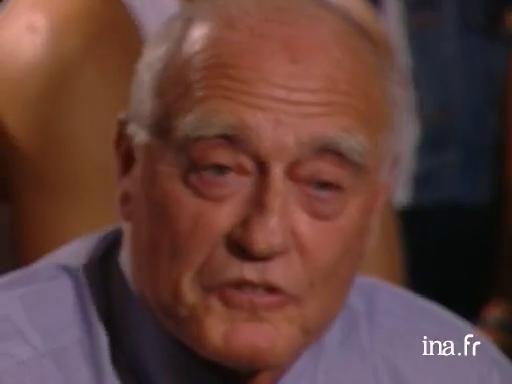Erich Lessing
One of my first reports, in 1950, for the Marshall plan, was a report on the Turkish refugees that had to leave Bulgaria.
And at that time, the large waves of refugees, the "displaced persons" had already ended, was already over, and the report was entitled almost everywhere in Europe, "The Last Refugees".
We really didn't know.
Laure Adler
We thought at the time that it would be over...
Erich Lessing
People really had no idea at all about what to expect?
That I think for me poses the question today, but not only today, of the problem of photography as testimony.
Do we change anything?
Have we ever changed anything?
Are we not simply archivists, for the present and for the future, where some of our pictures become icons?
At the beginning there are pictures, broadcast reports, and then pictures for increasingly large numbers of people. Some remain as a permanent testimony, but the permanent question that I think we must ask ourselves, is this: do we change anything?
Do we make the least impression?
And I know that you do not have an answer to this, like myself actually.
John Vink
I have a very small one, a very small one.
I think that first we sometimes change things very punctually, but it is very very limited. But I return to the question.
I wonder...what would the world be like if we didn't photograph it?
Erich Lessing
Yes, exactly.
Laure Adler
We wouldn't know.
John Vink
We wouldn't know.
Erich Lessing
I have to be very grateful to the "Visa pour l'image", the International Festival of Photojournalism, for Perpignan...
Laure Adler
So "Visa pour l'image", is the great international festival of photojournalism.
Erich Lessing
The city of Perpignan gave the possibility to "Visa pour l'image" to have this enormous festival, these expositions, I think that this year we are hosting approximately 40 photographers, 40 different expositions.
And that it is perhaps the last refuge of journalism, of photojournalism.
Laure Adler
And of truth that is expressed raw.
Erich Lessing
Well, truth always expresses itself, but it no longer has any place for...
Laure Adler
One must not cheat either.
Erich Lessing
No, it no longer has any place to present itself because newspapers no longer exist.
Do not forget that I accompanied the Général de Gaulle in Algeria in 1958, and I had in Paris-Match the cover, and I think 24 pages. Today 24 pages no longer exists anywhere.
Laure Adler
Erich Lessing, you have photographed the Hungarian revolution.
Erich Lessing
Yes.
Laure Adler
There are such memorable photographs, unfortunately of horror and distress that remain ingrained in our memories.
What do you retain of those moments? Do you not say to yourself, since you were asking earlier, what is the point of photography?
It helped us to be able to feel something thanks to your images.
Erich Lessing
I am not sure, you see.
Laure Adler
Oh?
Erich Lessing
Still, the doubt is there.
The problem is that every picture of the revolution, any picture, of a revolution, a war, for the time being it influences.
And it has something to say. But does it really influence history? I don't think so.
That is why I was so long interested in politics and covered the major international conferences, because I believed that instead of our own destinies, it was more today in New York, at the United Nations or in Geneva, at the Palace of Nations.
And not in the streets of Budapest, or in the refugee camps, nor elsewhere where people are fighting for an ideal or have a story to tell.
I really believe that, behind the closed doors of the chancery, our destiny is truly determined.
Laure Adler
[Unclear]
Erich Lessing
It is one of the reasons why, after Budapest and after Algeria, I retired from current affairs photography.
I knew full well that maybe, nonetheless, maybe one day photography will influence something.
Vietnam, that is probably the point where reporting really influenced politics.





